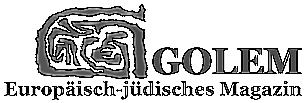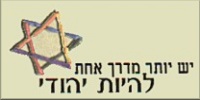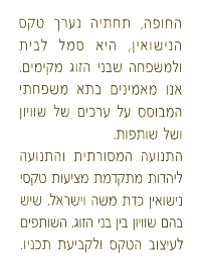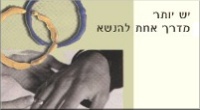| hagalil.com - bet-debora.de | |||
|
| |||
|
Eternal Volunteers: Voluntary Jews in Europe today are free to choose their own form of Jewish identity. To envision which form might occupy the European Jewish center-stage, it is helpful to look at the two opposite extremes of the spectrum. At one end are what might be described as assimilated 'Israelites' whose Jewish identity is based on tenuous Jewish roots and a certain humanistic, 'ancestral' respect for Jewish tradition. 'Israelites' have one ambition: to become just like everybody else in their respective nations. In order to prove that they merit such egalitarian treatment they have often been passionate patriots. Assimilation had its origins in the pre-Holocaust past, but it survived into the post-war period and has been gradually losing meaning ever since Today Jews no longer have to demonstrate their patriotism in order to prove that they merit equal treatment. As fully-fledged citizens of a democracy, they belong. No one forces them to hang on to their tenuous Jewish roots. We may collectively regret or fear their withdrawal from the Jewish fold, but that freedom to withdraw is the other side of the positive coin of the voluntary Judaism of post-1989 Europe. It is also interesting to note the virtual disappearance of another pre-Holocaust Jewish type, the self-hating Jew. Now that Jews are free to disappear into society at large, this sad and perversely poignant figure need no longer be bound to the identity of his forebears.At the opposite extreme stand the ultra-orthodox Jews who define themselves in terms of a self-contained and eternal Jewish religious identity with quasi-racial overtones, These Jews live in their own voluntary ghettos, consciously cut off from the rest of society by their lifestyle and social contacts. Their only tie to the rest of the world is through the modern market economy in which they often play a highly functional role. As citizens of their respective democracies, they wield political influence through the ballot box, casting votes for the benefit of orthodox Jewry but without any particular sense of commitment to public life. Their only commitment is to the Torah. Everything else is historical contingency. This lack of commitment to democracy has been dramatically illustrated by the attitude of ultra-orthodox groups to the state of Israel, evident before the Rabin assassination. It would be ridiculous, therefore, to attribute to them any sense of European 'belonging'. Yet in a new pluralist Europe these pockets of ultra-orthodox Jews must not only be tolerated by other Jews but even appreciated, provided they too become sufficiently tolerant to accept other Jewish positions-as well as the rules of the game of the outside world. For these ultra-orthodox Jews do anchor Judaism to a living talmudic faith. Without them, Judaism as a whole would be immeasurably impoverished. The range of possible European Jewish identities runs between these two extremes. Jews, like all other groups with a particular identity, pursue two parallel goals: on the one hand, to be treated as citizens like all others while, on the other, to be guaranteed the right to live as they wish. In post-1989 Europe, regardless of the degree of democratization and pluralism, all countries, East and West, treat their Jews as full citizens with equal rights. Political and legal equality-as well as social equality-are no longer issues at a pan-European level. Jews are no longer pariahs in Hannah Arendt's sense of the term. They would no longer stand out as distinctive characters in a modern-day Proustian salon, for there is no longer only one ('Christian') route to success. The conversions to Catholicism and Protestantism which many prominent Jews were obliged to undergo in the first half of the century, in order to pursue careers in Mitteleuropa (or in Western Europe), are unimaginable today. How should Jews define themselves in society? In Europe, post-1989, the question is not so much how different states treat Jews but rather how Jews define themselves with respect to their own societies. Do they wish to be perceived as fully assimilated citizens with a unique religious affiliation, as a religious minority, an ethnic minority, a freely constituted 'pressure group' with specific rights, a community or a people? A majority of Jews would probably feel most at ease with a composite definition of their identity. How they choose to define their sense of belonging and their otherness will influence the making of a European Jewish identity. Above all, it will offer a useful reference point for other groups in our modern pluralist democracies, for the complexity of the Jewish identity resembles many other existential situations in the new Europe. It is therefore important to analyze the possible definitions in greater detail. The assimilationist definition of Jews as identical to all other citizens except for their religious affiliation collapsed under the weight of the Holocaust. Jews were not deported from their respective countries and killed by the Nazis because they had a different religion, but because they were perceived as a separate and distinct, and damned, race. Nor does the definition of the Jewish community as a religious minority prove any more satisfactory. The Holocaust was not the equivalent of the massacre of the Saint Bartholomew in France when Protestants were killed because they were Protestants but spared if they converted. Jews were killed because they were Jews even when they no longer identified as Jews. How Jews choose to define their sense of belonging and their otherness will influence the making of a European Jewish identity. Above all, it will offer a useful reference point for other groups in our modern pluralist democracies. In a pluralist democracy with a strong civil society, individuals are not just abstract citizens plus a religion; they are infinitely complex beings with multiple identities. For post-war Jews the Holocaust, on the one hand, and the creation of the state of Israel, on the other, reinforced the sense that they belonged to a people with a common destiny. No longer would they allow themselves to be splintered into exclusive, nationalist pigeon-holes or defined in purely religious terms, for, after all, not all Jews are religious. Nor are Jews a minority (except of course in purely numerical terms). This notion-always resisted in the strongly consolidated Western European nation-states such as Great Britain and France-is commonplace in Eastern Europe where it has had a long and tormented history, which has resurfaced with the collapse of Communism. A minority, however, is defined in relation to a majority, and here again it is not easy to define the minority status of Jews. Is it religious, ethnic or linguistic? None of these categories makes sense any longer, even in Eastern Europe where, before the Holocaust, Jews constituted an ethnic/religious minority held together by a common religion and a common language (Yiddish). Eastern European Jewry in this sense has disappeared utterly. Jews are no longer an ethnic group with its own identity, language or status. The shtetl is gone. To this one must add another crucial factor: the existence of Israel. Because the Jewish people now has its own land, European Jews can no longer claim for themselves the status of a minority or an ethnic group, for this would imply that they are a piece of Israel in another land, namely Israelis in Europe. Few Jews in Europe or elsewhere would define themselves as such regardless of the intensity of their ties to Israel. The acceptance of multiple loyalties In post-1989 Europe the time has come to confront the complex and often intertwined components of Jewishness, and to admit openly what every Jew in the Diaspora has always known: it is virtually impossible to work out a tidy definition of 'Jewish identity'. Clear-cut definitions of belonging have always been the trademark of nationalist or authoritarian states (whose slogans often turned on the notion of 'one' ruler, 'one' people, 'one' state). Pluralist democracies thrive instead on nuance and complexity. This is why it is possible for Jews to prosper in such circumstances, not only in economic and material terms (something possible even in non-democratic countries), but far more significantly in existential terms. In the aftermath of the Holocaust when European Jewry was nearly annihilated, the Jews in Western Europe have been able to live out their complex identities by virtue of what can only be described as an implicit pact between them and their respective states. Jews have been not only obviously free to practice their religion or culture in whichever way they have seen fit; they have been able, more importantly, to carry on a special relationship with another country, Israel, as well as simultaneously to commit themselves fully to the political, religious and social well-being of their fellow Jews elsewhere in the Diaspora. In other words, post-war Jews have been allowed free movement within a network of uncontested multiple loyalties. They could campaign on behalf of Israel or of Soviet Jewry (by way of example) with an intensity which often exceeded their own country's foreign policy, without being 'curbed' or censored. Western European Jews have obviously behaved as loyal citizens of their respective states, participating fully in the democratic life of their countries. The deep ties which bound them to Israel and to their fellow Jews elsewhere have been accepted by the Western democracies of which they were citizens largely because-of the Holocaust, as though it is understood that Jewish citizens could thereafter no longer adhere to a simply national definition of their identity. The right to feel a special bond with a 'homeland' or with people in other countries who share a common language, religion, history or culture should become an explicit right for all Europe's increasingly diverse citizens. This acceptance of Jews' multiple loyalties has, however, been only implicit. Nowhere was it decreed or spelled out. In tomorrow's pan-Europe such an acceptance must become explicit, and not only for Jews, but for other groups as well. The right to feel a special bond with a 'homeland' or with people in other countries who share a common language, religion, history or culture should become an explicit right for all Europe's increasingly diverse citizens. Multiple loyalties should be construed as a spin-off of the democratic right of expression, available equally to Hungarians in Romania, Russians in Estonia, and Turks in Germany. Multiple loyalties, however, are only acceptable if people behave as loyal citizens, playing by the democratic rules and respecting the legal framework of their respective countries. What was given implicitly to Jews out of guilt should be given explicitly to all as an inherent democratic right. It is in the nature of a general pluralist democracy that Jews are able to pursue their multiple loyalties, and in doing so forfeit any special agreements that may have previously protected them. Jews should no longer feel defensive about their multiple loyalties or about their ways of feeling Jewish; they should instead proclaim them openly as legitimate modi vivendi in a pluralist democracy. Since non-Jews have equally complex identities, it is always wrong to jump to the conclusion that they are being anti-Semitic if they say something negative about Jews collectively. At present, non-Jews are damned if they forget to emphasize a Jewish perspective, but they are also damned if they evoke one, for one Jew's stereotype is another Jew's truth. One must have the courage to admit that Jews are quick to sound the alarm of 'anti-Semitism' whenever non-Jews try, often in a gauche manner, to touch on historical, personal, religious or political topics linked to Jews. Jews should also become less paranoid about cultural stereotyping and recognize that, in the future, they may (and should) be treated as one group among many others. Jews should save their ammunition for the menace of real anti-Semitism: a collective psychological disease and a deeply embedded political mindset which must be attacked whenever and wherever it raises its head, but must not be confused with the informal, often ironic and harmless characterization of 'others' in a pluralist democracy. What is significant is that Jewishness is now one among the many specific manifestations of a working pluralist democracy rather than a special category with special rights and privileges (and taboos) which are not available to any other group. Only in this spirit can Jews participate in a newly defined sense of national and European 'belonging'. |
| ||
| |||




